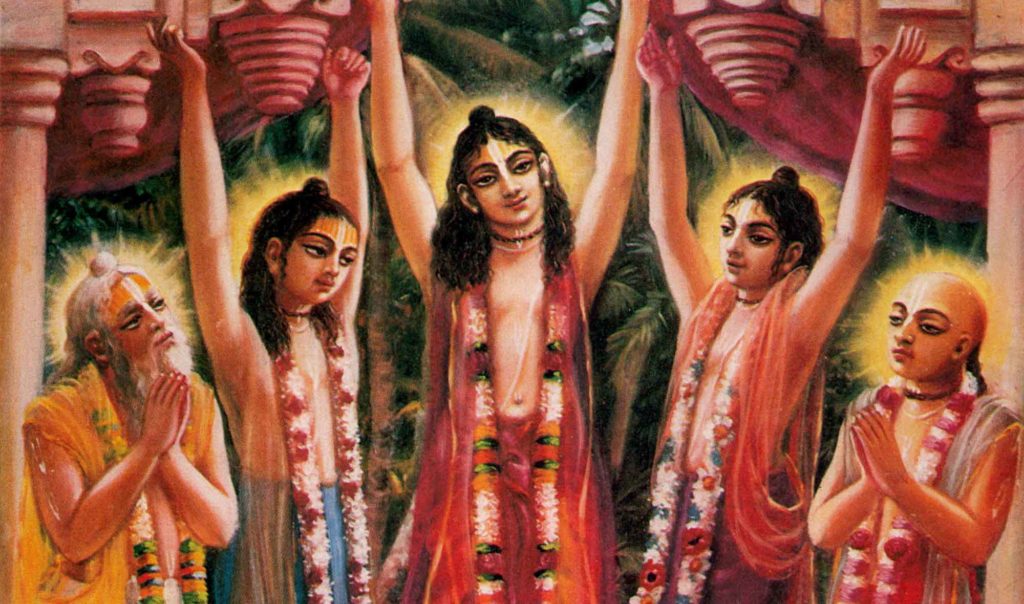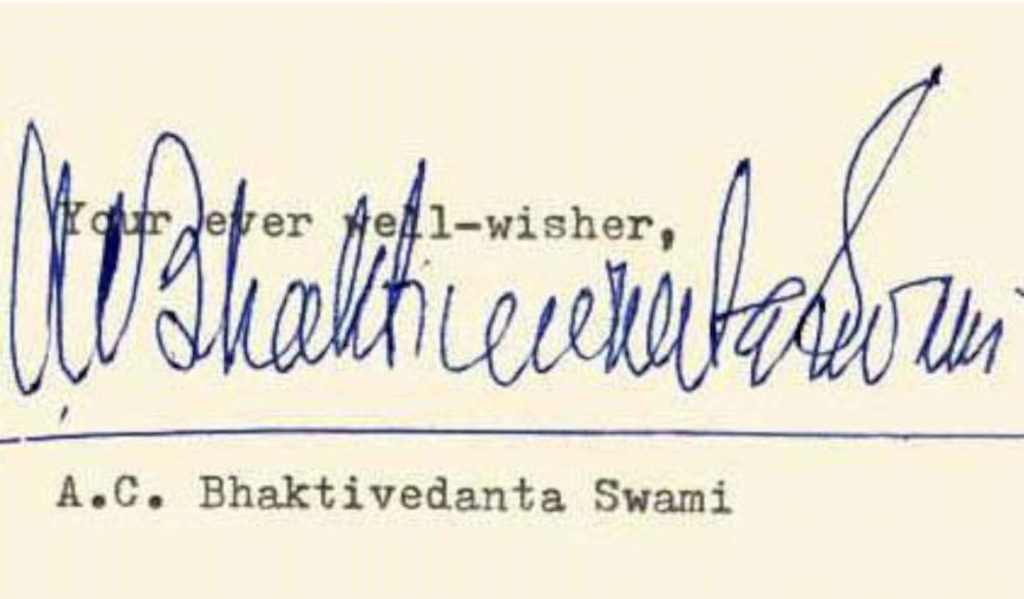Overview
To Be a Servant’ by Swami Bhakti Gaurava Narasingha, was written on March 30th 2002. In this article, Narasingha Maharaja makes the point that a proper service attitude is required in order to make advancement, and how we are where we are due to prasādam.
The truth should be spoken in a straightforward way, so that it will benefit others. I have heard that, in the greater Kṛṣṇa consciousness movement, certain women clamour to be called ‘Prabhu.’ Actually, all devotees are called Prabhu, but a real devotee clamours, “Call me your servant, call me your dog.” Why do you want to be called Master? Why demand, “Hey, call me Master!” and expect others to respect you? Where did we learn this, “Call me master?” “Call me your dog; call me your servant.” Do not lose sight of this; do not lose sight of the service attitude.
I met Śrīla Prabhupāda’s sister. I was a sannyāsī at that time, a young sannyāsī, and I offered my obeisances to Śrīla Prabhupāda’s sister, Pisimā. The devotees gave her all respect, but she had no demand to be called Prabhu. Today we hear demands to be in the front of the temple, then later we hear the demand to be in the back of the temple. Front, back – the problem is the demand.
Women are close to Kṛṣṇa consciousness by birth, by life, by society; they are much closer to Kṛṣṇa consciousness than men are. It is the life that most men do not get until we are very old. What is that life? One is protected and given some service to perform. Women do not have to be involved in arguments; they can actually live the real life of a devotee. They can easily develop Vaiṣṇava humility and the habit of serving others. It is that last little step that is so difficult.
So many people receive some prestigious position. Unfortunately, these honoured positions have sent hundreds of devotees to their spiritual graves. When there is a war, we do not expect the women to grab the bayonets and run onto the battlefield. Why would someone want to demand that bayonet? That is very dangerous. It is the natural position in society for a woman to be protected, and it is so easy to become Kṛṣṇa conscious from that position, because it is the position of the servant. Men run the risk of thinking that they are in charge. In reality, they are not in charge of anything.
Nobody but Kṛṣṇa is controlling anything; everyone is simply trying to whittle down the ego and discover who we really are. “I am a servant; I am a servant of Kṛṣṇa.” To actually be Kṛṣṇa’s servant, one must be the servant of His devotees. We should be saying, “Call me servant”, not, “Call me Prabhu.” That is a spiritual defect. We clamour for things; we want things that are not good for us. We should understand what it means to be a servant; that is the deeper understanding. To make spiritual advancement requires an appreciation for the proper service attitude, and also an appreciation for prasādam. They are intimately connected.
What is prasādam? What is our realisation of prasādam? Sometimes in accepting prasādam, Mahāprabhu would become very emotional. Sometimes he would become very anxious and shout, “Oh! It is tasted by Kṛṣṇa! Other times he would shed tears, sometimes he would choke up, and sometimes all of these emotions would manifest at once. If we are taking prasādam for granted, thinking that it is food, then we are accepting prasādam for enjoyment, and that is our mistake. In his purport of Text One of Śrī Upadeśāmṛta, Śrīla Prabhupāda writes that if one accepts prasādam only because of its palatable taste and eats too much, then he will fall victim of the senses. He will be captured by māyā. He goes on to explain that Sri Caitanya Mahāprabhu teaches us to avoid palatable dishes even while honouring prasādam. In Caitanya-caritāmṛta (Antya 6.227), the Lord states:
jihvāra lālase yei iti-uti dhāya
śiśnodara-parāyaṇa kṛṣṇa nāhi pāya
“He who runs here and there seeking satisfaction of the palate and who is attached to the desires of the stomach and genitals is unable to attain Kṛṣṇa.”
Even if it is mahā-prasādam, we can spoil our experience of it. We can victimise ourselves with the enjoying spirit even while taking mahā–prasādam. Instead, we must remember always to honour prasādam.
Once, Śrīla Prabhupāda’s plate came out of his room in Vṛndāvana, and I reached to take a rasagulā that remained on Śrīla Prabhupāda’s plate. The servant quickly moved the plate out of reach and picked up the rasagulā, crumbled it, and dropped it into the dhāl. Then he took the sweet rice and poured that into the dhāl. I just sat there watching him, wondering why he was doing this, mixing all the different preparations that Śrīla Prabhupāda had left. It all became a yellow-green mixture. And then he offered me a scoop of that mixed mahā-prasādam. Noticing my expression of wonder, he said that Śrīla Prabhupāda had told him to do this to his mahā-prasādam, otherwise devotees would eat it just for sense gratification. And from that day, for the next seven or eight months, Śrīla Prabhupāda’s mahā–prasādam was only distributed in that way.
We do not regularly mix all the mahā-prasādam together; people would think that we were mad. That order was temporary, to teach us an important lesson on how to properly honour prasādam. Sometimes, some particular conception may descend in the company of the very high and genuine Vaiṣṇavas, and then that will be followed, maybe not for all time, but for some time, following a particular mood. The instruction was not, “Make sure you mix all the prasādam.” That was not the instruction; the instruction for all time is, “Do not become the enjoyer; remember that prasādam is Kṛṣṇas mercy.
Kṛṣṇa consciousness is a descending process, but unfortunately we are dealing with it by the ascending process. Technically, you should not even serve yourself prasādam. If it can be arranged, you should not serve yourself. During special circumstances, it may be a practical procedure because all the devotees are very busy. We may certainly make such changes because it is practical, but sometimes that accommodation for a special circumstance may become a new standard. But is the new standard correct?
Prasādam should be given. Prasādam is also not to be served by bhaktas; it is actually to be served only by initiated devotees. Who can serve the Lords mercy to another living being? Somebody off the street who just came in? Do we spot such a person and say, “Hey you! Come serve prasādam!” No, it is not possible, actually. Do you think that you can just catch anybody and say, “Come on, serve Śrīla Prabhupāda’s prasādam?” No, only the sannyāsīs, only the older ladies, older gṛhastha men, only senior devotees can do that. And if someone is in māyā, are they going to serve Śrīla Prabhupāda’s prasādam? No, only devotees of some devotional status can do that.
Prasādam is not an object. Part of honouring prasādam is the act of giving and receiving. Many of the younger devotees received cookies from Śrīla Prabhupāda when they were children. If Śrīla Prabhupāda is offering you a cookie from the vyāsāsana, and at the same time the temple president is at the door saying, “Oh don’t worry Prabhu, I’ll give you a cookie,” what would you do? You would say, “I’ll be back for this one later,” and you would go to Śrīla Prabhupāda. Is that just so that you can say you got a cookie from Śrīla Prabhupāda? No, that is not why. When the Lord’s mercy is distributed by the Lords pure devotee, a double potency is there. The temple president is also the Lords devotee, but taking the opportunity when available to connect with the higher Vaiṣṇavas is very beneficial.
Some may consider devotees to be ordinary people, but actually, devotees are not ordinary. We can keep always the mercy of the Supreme Lord by catching the feet of the devotees. Catch the feet of His dear devotees! That is the best way to access His prasādam. All devotees in the Kṛṣṇa consciousness movement should try, according to their capacity, to develop a deeper appreciation for those things that are seemingly ordinary, because we experience them every day.
Somebody once asked me how I became a devotee. I said, “Prasādam”, and they thought, “Mahārāja is an old, old devotee – that must have been some high philosophical point.” No, it is easy to understand: I became a devotee for prasādam, and I remain a devotee because of prasādam. What is prasādam? It is the Lords mercy. I became a devotee by His mercy, I remain a devotee by His mercy, and independent of His mercy, I am finished.
Related Articles & Books
- Vaiṣṇava Nindā by Śrīla Bhaktivinoda Ṭhākura
- A Devotee is Merciful (Sajjana – Kṛpālu) by Śrīla Bhaktisiddhānta Sarasvatī Ṭhākura
- A Devotee Does Not Engage in Violence (Sajjana – Akṛta-droha) by Śrīla Bhaktisiddhānta Sarasvatī Ṭhākura
- A Devotee is the Epitome of Truth (Sajjana – Satya-sāra) by Śrīla Bhaktisiddhānta Sarasvatī Thākura
- Śiva-tattva & the Position of Lord Śiva by Śrīla B.R. Śrīdhara Mahārāja
- Oh Bābā! Bolacche-re! by Śrīla B.R. Śrīdhara Mahārāja
- Problems and Solutions by Śrīla B.R. Śrīdhara Mahārāja
- The Highest Attainment and Present Adjustment by Śrīla B.R. Śrīdhara Mahārāja
- Āgun Jvālbe (Light the Fire!) by Śrīla B.R. Śrīdhara Mahārāja
- Dharma and the Modern World by Śrīla A.C. Bhaktivedānta Swami Prabhupāda
- Faith Confirms the Absolute by Śrīla B.G. Narasiṅgha Mahārāja
- Go Deeper! by Śrīla B.G. Narasiṅgha Mahārāja
- To Be a Servant by Śrīla B.G. Narasiṅgha Mahārāja
- Harmony – Real and Apparent by Swami B.V. Giri
- The Definition of Faith by Gaura Gopāla Dāsa
- Ātma Samīkṣā – The Value of Introspection by Kalki Dāsa
- Frogs in the Well of Prejudice by Kalki Dāsa
Further Reading
- Śraddhā (Faith) – Quotes by Bhaktivinoda Thakura
- Śraddhā and Śaraṇāgati by Śrīla Bhaktivinoda Ṭhākura
- The Association of Sādhus by Śrīla Bhaktivinoda Ṭhākura
- Epilogue to Śrī Kṛṣṇa Karṇāmṛta by Śrīla Bhaktivinoda Ṭhākura
- Prīti (Love) by Śrīla Bhaktivinoda Ṭhākura
- A Dispute Concerning Mahāprasāda by Śrīla Bhaktivinoda Ṭhākura
- Śraddhā by Śrīla Bhaktivinoda Ṭhākura
- Materialistic Association by Śrīla Bhaktivinoda Ṭhākura
- Dispelling Doubts by Śrīla Bhaktivinoda Ṭhākura
- The Enemy by Śrīla Bhaktivinoda Ṭhākura
- A Critique of the book ‘Vanamālā’ by Śrīla Bhaktivinoda Ṭhākura
- Kali by Śrīla Bhaktivinoda Ṭhākura
- Offences Against Bhakti by Śrīla Bhaktivinoda Ṭhākura
- Kārttika-vrata by Śrīla Bhaktivinoda Ṭhākura
- Violence and Mercy by Śrīla Bhaktivinoda Ṭhākura
- Abandoning Bad Association by Śrīla Bhaktivinoda Ṭhākura
- Sad-guṇa and Bhakti by Śrīla Bhaktivinoda Ṭhākura
- The Process of Initiation by Śrīla Bhaktivinoda Ṭhākura
- Dainya (Humility) by Śrīla Bhaktivinoda Ṭhākura
- Vaiṣṇava Nindā (Offences to Devotees) by Śrīla Bhaktivinoda Ṭhākura
Pilgrimage with Swami Narasiṅgha – Part 7: Keśī Ghāṭa
Continuing with our pilgrimage series, this week Śrīla Narasiṅgha Mahārāja takes us to Keśī Ghāṭā where he tells us about Madhumaṅgala’s meeting with the Keśī demon, what Keśī represents, and how Śrīla Prabhupāda almost acquired Keśī Ghāṭa. Mahārāja also narrates his own experience. This article has been adapted from a number of talks and articles by Narasiṅgha Mahārāja.
Prema Dhāma Deva Stotram with the Narasiṅgha Sevaka Commentary – Verses 61-65
In verses 61 to 65 of 'Prema Dhāma Deva Stotram', Śrīla Śrīdhara Mahārāja narrates the pastime of Śrī Caitanya at Caṭaka Parvata In Purī and explains how the scriptures produced by Brahmā and Śiva are ultimately searching for the personality of Mahāprabhu who is merciful too all jīvas, no matter what their social position.
Prabhupāda Śrīla Sarasvatī Ṭhākura’s Visit to Ayodhyā
With the forthcoming observance of Śrī Rāma Navamī, we present 'Prabhupāda Śrīla Sarasvatī Ṭhākura’s Visit to Ayodhyā' written by Śrīla Bhaktisiddhānta Sarasvatī Ṭhākura Prabhupāda from The Gaudīyā magazine, Vol 3. Issue 21/ In December 1924, after visiting Benares and Prāyāga, Sarasvatī Ṭhākura visited the birth-site of Śrī Rāmācandra in Ayodhyā.
Śaraṇāgati – The Only Path to Auspiciousness
In this article, 'Śaraṇāgati - The Only Path to Auspiciousness', Dhīra Lalitā Dāsī analyses the process of śaraṇāgati (surrender) beginning with śraddhā (faith). She also discusses the role of śāstra and the Vaiṣṇava in connection with surrender.
Pilgrimage with Swami Narasiṅgha – Part 7: Keśī Ghāṭa
Continuing with our pilgrimage series, this week Śrīla Narasiṅgha Mahārāja takes us to Keśī Ghāṭā where he tells us about Madhumaṅgala’s meeting with the Keśī demon, what Keśī represents, and how Śrīla Prabhupāda almost acquired Keśī Ghāṭa. Mahārāja also narrates his own experience. This article has been adapted from a number of talks and articles by Narasiṅgha Mahārāja.
Prema Dhāma Deva Stotram with the Narasiṅgha Sevaka Commentary – Verses 61-65
In verses 61 to 65 of 'Prema Dhāma Deva Stotram', Śrīla Śrīdhara Mahārāja narrates the pastime of Śrī Caitanya at Caṭaka Parvata In Purī and explains how the scriptures produced by Brahmā and Śiva are ultimately searching for the personality of Mahāprabhu who is merciful too all jīvas, no matter what their social position.
Prabhupāda Śrīla Sarasvatī Ṭhākura’s Visit to Ayodhyā
With the forthcoming observance of Śrī Rāma Navamī, we present 'Prabhupāda Śrīla Sarasvatī Ṭhākura’s Visit to Ayodhyā' written by Śrīla Bhaktisiddhānta Sarasvatī Ṭhākura Prabhupāda from The Gaudīyā magazine, Vol 3. Issue 21/ In December 1924, after visiting Benares and Prāyāga, Sarasvatī Ṭhākura visited the birth-site of Śrī Rāmācandra in Ayodhyā.
Śaraṇāgati – The Only Path to Auspiciousness
In this article, 'Śaraṇāgati - The Only Path to Auspiciousness', Dhīra Lalitā Dāsī analyses the process of śaraṇāgati (surrender) beginning with śraddhā (faith). She also discusses the role of śāstra and the Vaiṣṇava in connection with surrender.








